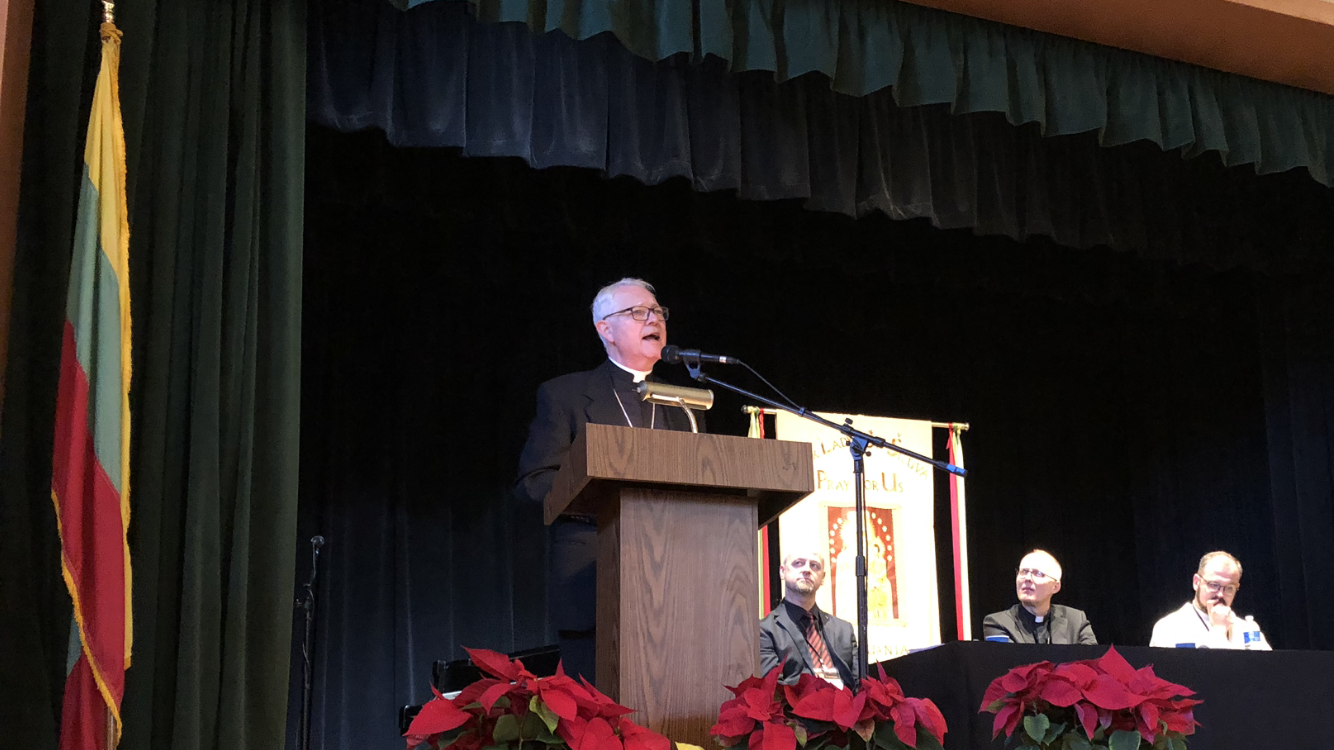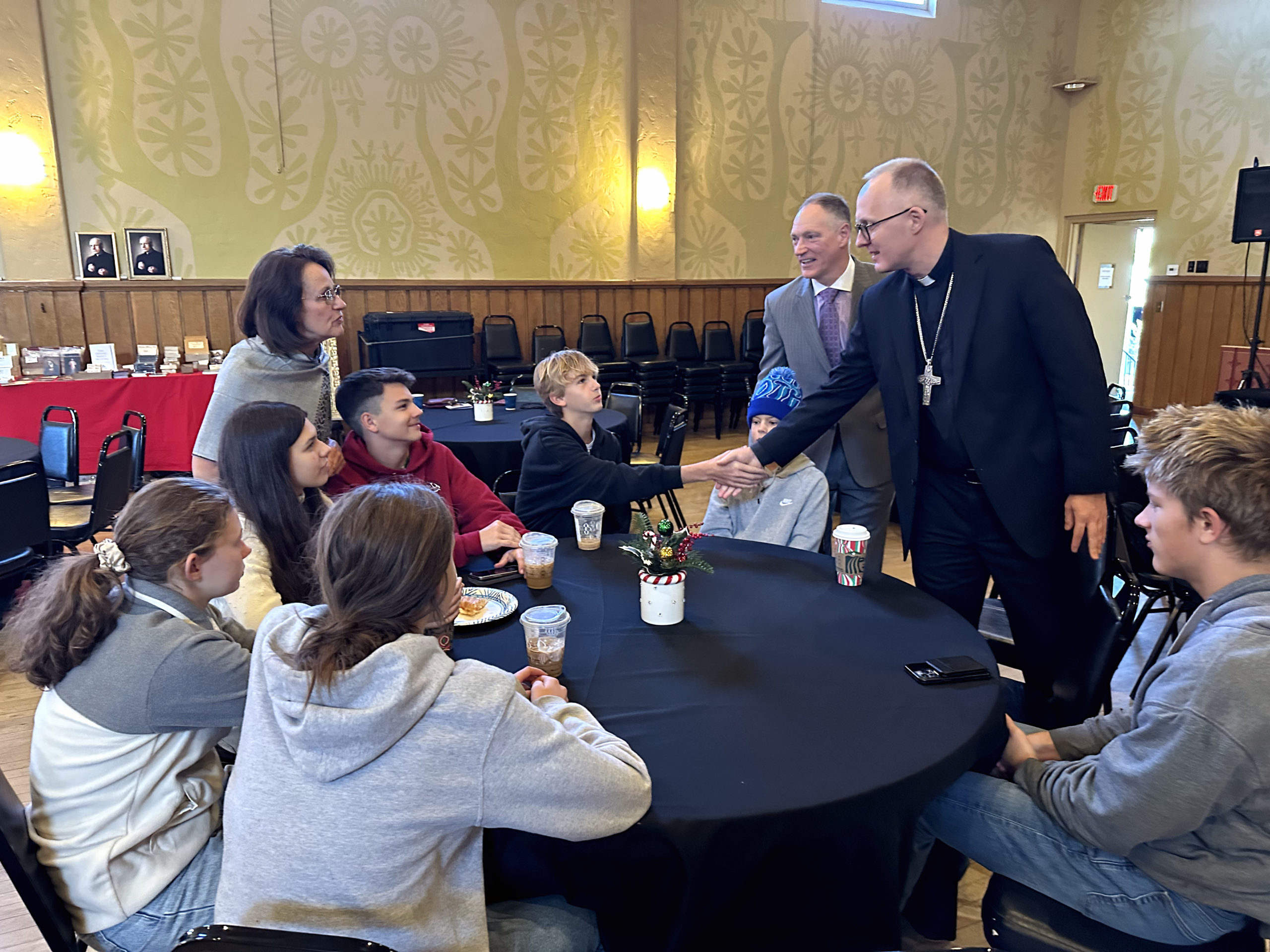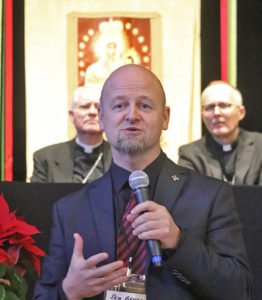Irene “Jurate” Venckus knows the saga and strength of her Lithuanian family.
Her grandfather was shot by invading Russians during World War II. Her uncle joined the resistance fighters.
No one attended church for fear of arrest.
The family eventually had to flee their homeland before finding safety and religious freedom in North America.
Venckus shared this harrowing story at “Su Kristumi,” the West Coast’s first religious congress of Lithuanians held Dec. 6-7 at St. Casimir Catholic Church in Los Feliz. Inside the parish hall that’s covered with flags and folk art, passions ran high on the subject of preserving Lithuanian identity.
“This parish is like my mission,” said Venckus, a catechist at St. Casimir. “If we don’t have the parish anymore we’re going to scatter. Events like this help keep the faith alive and through the faith we keep the Lithuanian community alive.”

Su Kristumi, Lithuanian for “with Christ,” was organized by the parish to celebrate and promote its ethnic and religious heritage. Thanks to donations and a grant from the Archdiocese of Los Angeles’ Called To Renew campaign, the conference offered speakers, music, Mass, confession, and recitation of the Divine Mercy Chaplet. As the West Coast’s only Lithuanian Catholic church, attendees came everywhere from San Bernardino to Seattle.
Father Tomas Karanauskas, St. Casimir’s pastor and a Lithuania native, insists now is the time to act since first and second-generation Lithuanian Americans are getting older and their legacies face abandonment in a modern metropolis.
“Living in the City of Angels, we can lose our wings,” Karanauskas said. “It’s challenging to keep alive our Catholic faith and Lithuanian culture. How can we honor our ancestor’s sacrifices? How can we carry the light of Christ into a world that desperately needs it? The answers to these questions begin here today.”
Throughout the weekend, attendees were taken on a journey of Lithuanian history from prosecution to liberation to a new chapter of evangelization, with talks from Los Angeles auxiliary bishops Matthew Elshoff, OFM Cap., and Slawomir Szkredka, SSD, as well as Lithuanian guests Father Jokubas Gostautas, OP, and Deacon Benas Ulevicius, Ph.D.
Ulevicius, a dean and theology professor, recalled his childhood under Soviet occupation when churches were closed and he had to secretly receive catechism lessons at a dental office. He says the faithful outwardly toed the line but privately prepared for better days.
“Wait and grow, wait and grow,” Ulevicius said. “It sounds like the Advent message. [We were] keeping our prayers alive, keeping our relationships alive … we are waiting but not waiting idle … We had an unbreakable spirit.”
Born and raised in Lithuania, Daiva Bartulis remembers those days as well. After moving to America, she committed to giving her daughter a different faith experience.
“It’s amazing. I’m getting right now what I missed in my childhood,” said Bartulis, parish council member of St. Casimir. “Religion wasn’t part of the culture. We couldn’t go to church. That’s why our daughter went to school here.”

St. Casimir Lithuanian Heritage School is held every Saturday so children can receive language, cultural and religious instruction. Students from the school and a confirmation retreat offered strong opinions after attending the congress.
“Without the traditions what are we,” said Jamileh Towli, 16. “we’re barely a culture, barely a country. It’s the traditions, the history, the holidays, the mythology … that make us Lithuania.”
Markus Petrusis proudly wore a baseball cap bearing the Lithuanian coat of arms. The 15-year-old said the lectures were interesting and made him think about his role as a young Lithuanian American.
“It means I try to learn the language, celebrate the culture and eat the great food,” he said.
Bishop Szkredka, a native of Poland, welcomed the students and thanked the Lithuanian community for always welcoming him. Growing up during the waning years of Communist rule, the bishop spoke about the relief that comes from liberation — be it physical or spiritual — and reminded the crowd to move forward with Jesus.
“When he sets us free, this is not the end of the story,” Szkredka said. “We need to invite him to be in our hearts. It’s not enough just to enjoy the healing, the forgiveness, the liberation. We respond to that by holding onto Jesus and telling him, ‘Lord I want to do your will.’ ”
Opening his talk with the classic hymn, “Joy to the World,” Bishop Elshoff spoke to the crowd about becoming “spirit-filled” evangelizers. Using Pope Francis’ encyclical, “Evangelii Gaudium” (The Joy of the Gospel), as a guide, the bishop encouraged the crowd to think about how they can evangelize others with their love of Christ and then assigned some “homework” for the holidays.
“We all know about Lenten resolutions,” Elshoff said. “I’d like to encourage you to make an Advent resolution. I would like you to pray and live that resolution to Christmas and bring that intention with you before the Christmas crib as your gift to the baby Jesus.”

In the audience, Laura Kush was taking notes and nodding her head. As a member of the West’s only chapter of the Knights of Lithuania, she knows there’s work to be done if traditional customs are to survive in the U.S. However, she also worries about what’s happening abroad.
“With Russian aggression against Ukraine, which is very close to Lithuania, we need to keep what our ancestors worked toward,” said Kush, public relations chair for the Knights of Lithuania. “We need to keep NATO strong and our homeland free.”
In addition to speaking, Father Gostautas gave the homily at Mass. The monastery prior made a point of greeting parishioners and learning a little about their lives.
“This is my first visit to the United States,” Gostautas said. “I was very happy to see that the Lithuanian community is still vibrant and active and remembers its Lithuanian roots.”
Vidal Aguas, who heads religious and administrative affairs at the parish, was the one who first suggested a congress.
“We thank the almighty that with this conference we were able to bring Christ and reawaken generations of Lithuanian expats to their Catholic faith,” Aguas said. “We hope [they] come to Sunday Mass, receive the sacraments and teach their children.”